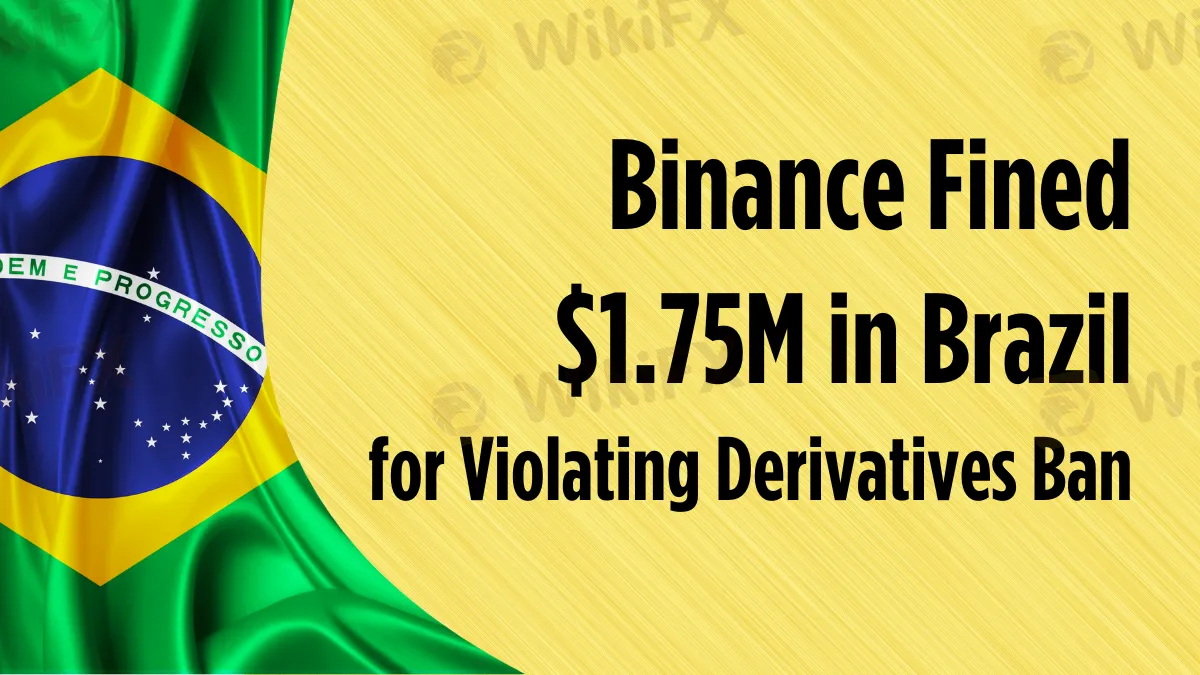简体中文
繁體中文
English
Pусский
日本語
ภาษาไทย
Tiếng Việt
Bahasa Indonesia
Español
हिन्दी
Filippiiniläinen
Français
Deutsch
Português
Türkçe
한국어
العربية
Binance Fined $1.75M in Brazil for Violating Derivatives Ban
Abstract:Binance agrees to pay $1.75 million fine to Brazil's CVM for offering unauthorized derivatives. The settlement highlights Binance's ongoing regulatory compliance efforts.

Binance has agreed to pay a $1.75 million fine to Brazil's Securities and Exchange Commission (CVM), resolving a long-running dispute over the exchange's unlawful derivative product offerings in the nation. The accord was struck after years of discussions after CVM's 2020 decision to prohibit Binance from offering derivatives in Brazil. These financial products were considered securities under Brazilian law, and Binance lacked the legal permission to act as a securities intermediary.
The settlement strengthens Binance's efforts to comply with local legislation. As part of the deal, Binance will pay 9.6 million reals, or $1.75 million in US currency. A Binance spokesman stated that the business no longer provides futures in Brazil, emphasizing that the exchange has made significant measures to comply with regulatory standards. “Since the regulator's first communication to Binance in 2020, the exchange has taken all necessary actions to respond to the authority and comply with local requirements,” a representative told me.
CVM's acceptance of the settlement, also known as a Term of Commitment, demonstrates the agency's recognition of Binance's continuous efforts to comply with Brazilian rules. The spokesman said this decision demonstrates the sufficiency of Binance's changes and enhancements over time to fulfill the country's regulatory requirements.

Despite the restriction on derivatives, Binance's Brazilian payment provider, Latam Gateway, continues to function lawfully inside the country's banking system. In 2023, Latam Gateway received a license from Brazil's central bank, enabling it to operate as a payment institution and electronic money issuer. This clearance enables the company to provide payment services and electronic money issuance inside Brazil's regulated financial environment.
Previously, Binance had to stop deposits and withdrawals in Brazilian reals using the government's payment system Pix due to new “know your customer” regulations enforced by the central bank. In response to regulatory constraints, Binance has considered expanding into Brazil by purchasing local banks and payment processors. The business has signed a memorandum of understanding to purchase Sim; Paul Investimentos, a Brazilian securities brokerage firm. However, this deal must still be approved by Brazil's Securities and Exchange Commission and the central bank.
Brazil is a vital worldwide market for Binance, and Latam Gateway plays an essential role in easing operations. Latam Gateway also services other businesses in Brazil, including gaming companies such as Codashop, Moedaz, and Game Hollywood. However, Binance is presently the sole cryptocurrency client in the nation.
Related news:
Stay updated with the latest developments in the crypto world. Read more about Binances settlement in Brazil and other breaking news on the WikiFX news page now!

Disclaimer:
The views in this article only represent the author's personal views, and do not constitute investment advice on this platform. This platform does not guarantee the accuracy, completeness and timeliness of the information in the article, and will not be liable for any loss caused by the use of or reliance on the information in the article.
Read more

Malaysia’s Crypto Landscape: Adapting Amidst Global Ambitions
The United States is intensifying its efforts to become a global cryptocurrency hub under President-elect Donald Trump. Experts believe this move could prompt countries, including Malaysia, to reassess their regulatory approaches toward digital assets.

SEC Approves Hashdex and Franklin Crypto ETFs on Nasdaq
The SEC has approved crypto index ETFs by Hashdex and Franklin Templeton, including Bitcoin and Ethereum, marking a milestone in crypto asset investment.

North Korean Hackers Steal $1.3bn in Cryptocurrency in 2024
Over $2.2bn in cryptocurrency stolen in 2024, with North Korean hackers accounting for $1.3bn. Discover how cyber theft impacts the evolving crypto landscape.

ASIC Sues Binance Australia Derivatives for Misclassifying Retail Clients
ASIC accuses Binance Australia of misclassifying 500+ retail clients as wholesale, denying key consumer protections for crypto derivatives. Penalties and reforms are underway.
WikiFX Broker
Latest News
Geopolitical Events: What They Are & Their Impact?
Top 10 Trading Indicators Every Forex Trader Should Know
ASIC Sues Binance Australia Derivatives for Misclassifying Retail Clients
WikiFX Review: Is FxPro Reliable?
Malaysian-Thai Fraud Syndicate Dismantled, Millions in Losses Reported
Trading frauds topped the list of scams in India- Report Reveals
Why Do You Feel Scared During Trade Execution?
WikiFX Review: Something You Need to Know About Markets4you
Revolut Leads UK Neobanks in the Digital Banking Revolution
Fusion Markets: Safe Choice or Scam to Avoid?
Currency Calculator



